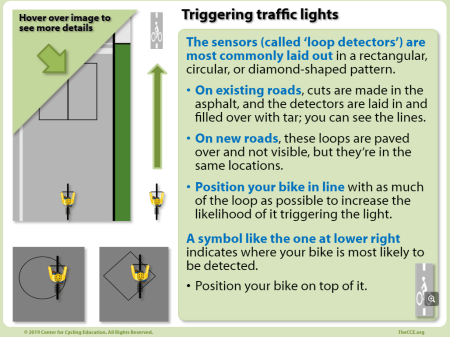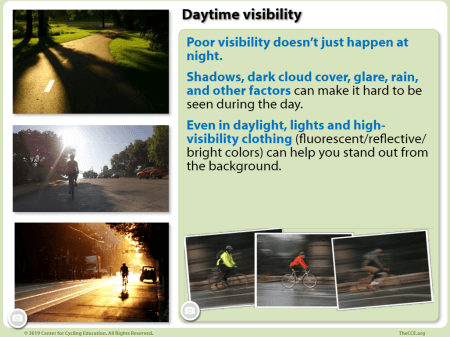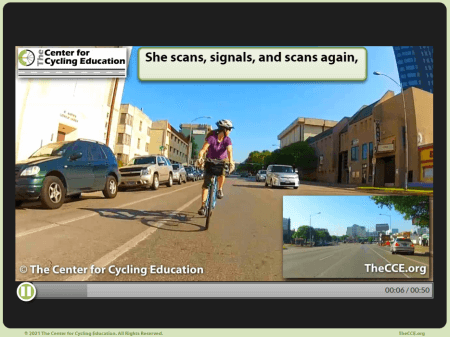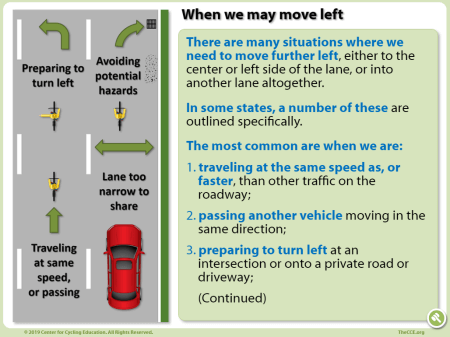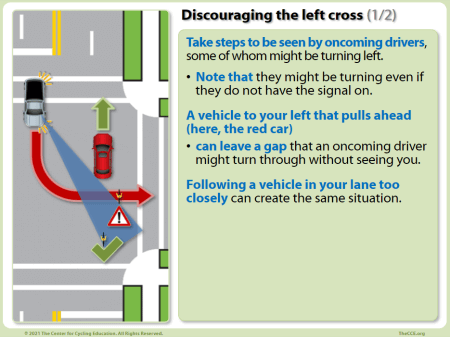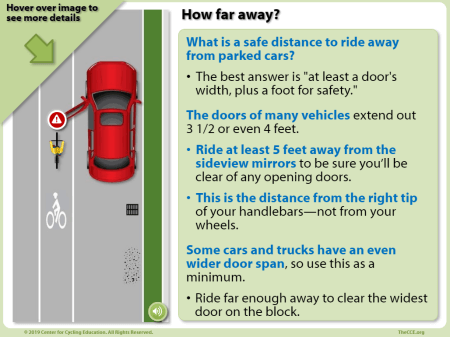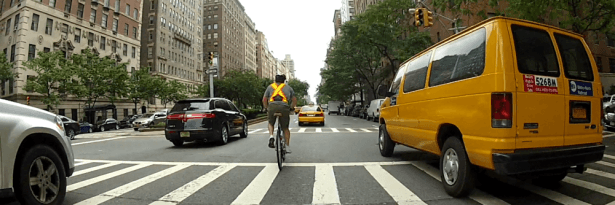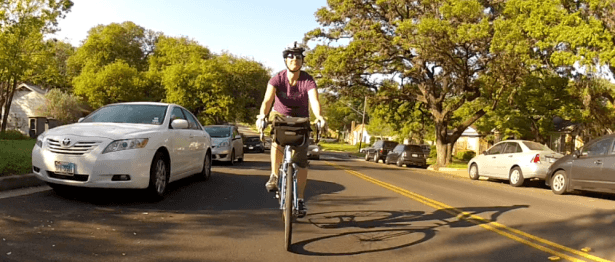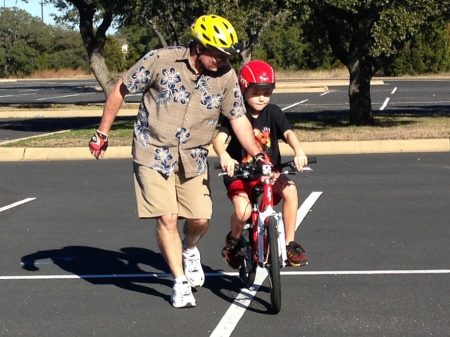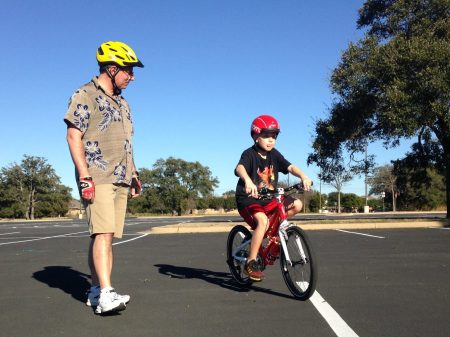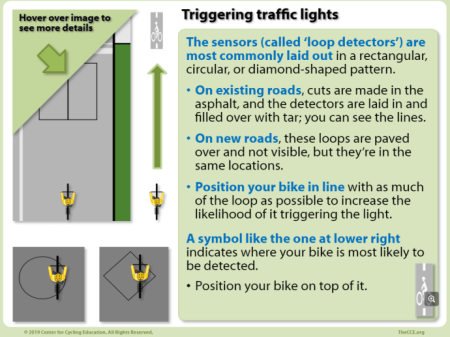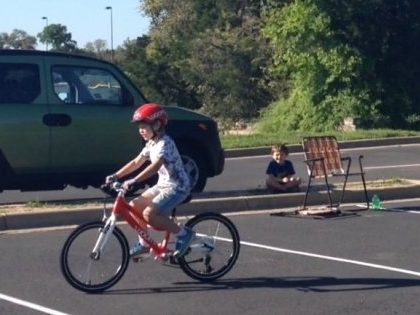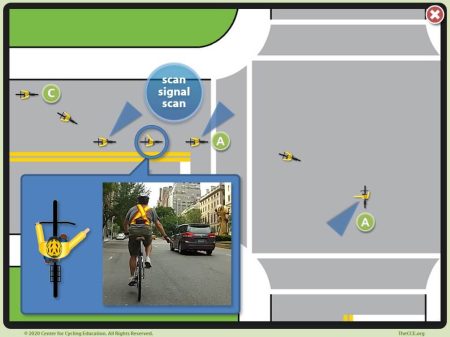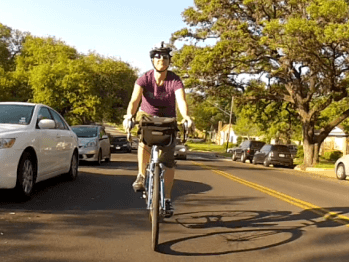Sample content from our online cycling courses.
Separate versions for the USA & Canada
Easily get access for your organization’s personnel.
Individuals • Businesses • Government agencies • Universities, colleges, & schools • Non-profits • Advocacy groups • Charity ride organizations • Cycling clubs
Volume purchase discounts available. Details here.
What will you take away from this bicycling course?
- Gain significant skills to help you be more competent & comfortable riding in traffic.
- Discover the rights & responsibilities you have while riding your bike.
- Explore proven ways to encourage more drivers to respect these rights.
- Understand the impact of your actions in traffic, and how you can influence others to co-operate with you.
- Reduce your chances of a crash or collision, or of getting a traffic ticket.
- Increase your chances of gaining work involving cycling or transportation demand management.
No matter what type of riding you do, or want to do
commuting • recreational • delivery • touring • training for: triathlon / road / randonée / criterium / time trial
this course will help increase your comfort and competence out on the street.
- Enjoyable, engaging, interactive content: video, text, photos, graphics, animations, & quizzes.
- 2 to 5 hours of exploration.
- Learn from any location, at your own pace.
- View it a bit at a time, or all at once.
- Get it for yourself, or as a gift for a friend or family member.
"This is such an excellent resource. I’ve been commuting to school/work for 12 years and consider myself to be a pretty good rider, but I learned so much here. I’ve read plenty of things online and even a few books, but this addressed a lot of concerns I had and presented new info in a way that’s easy to comprehend (the graphics and videos helped a lot).
"I liked that I could go back in when I wanted and it kept my place.
"I’ve been trying out what I learned on my rides this week, and it’s already making a big difference. Thanks!"
— Stephen R.
- Only $35* for 1 year of access.
- 30-day money-back guarantee. (Does not apply to ticket dismissal course.)
- Return as often as you like to review and improve.
* The price for the course will soon increase. Why? In the last year, we’ve added a significant amount of content—more than 60%—as well as many navigational features. This has taken more than a thousand hours of development. The new price will reflect this added value available to you now at a lower cost.
Being an MVP-C
Being an MVP-C
- What does this mean?
- Manoeuvrable: Creating space around you
- Visible: Being seen, day and night
- Overview
- Daytime visibility
- Nighttime visibility
- Lights & lighting configurations
- Clothing
- Predictable: Helping others make the right decisions
- Set up mutual communication
- Make your own decisions
- Know what’s coming
- Give advance notice
- Other ways to make it easier
- Communicative: Getting across the right messages
- Overview
- What do we need to communicate?
- How can we communicate?
- Lane choice & lane positioning
- Hand signals, higher cadence, eye contact, sound
- Think people, not cars
- Making it positive
- Putting it all together: MVP-C
Equipment
Equipment
Optional: Parts of the bike
Checking your bike for safety
- ABC Quick Check
- A more detailed check
- ‘Do it yourself’ vs. ‘Let them do it’
Sizing, configuring, & adjusting your bike
- Checking for fit
- 1) Frame size
- 2) Saddle height
- 3) Saddle position: forward/back/tilt
- 4) Handlebar position
- Making adjustments
Required & optional equipment
- Brakes
- Lighting
- What’s needed, and when
- Lights & lighting configurations
- Reflectors & reflective materials
- Using more than the basics
- Helmets
- Overview
- Choosing a helmet
- Wearing it right
- Putting the helmet on
- Checking that it’s the proper size
- Including fixed-gear bikes (‘fixies’)
Parking your bike
- Deterring bike theft
- Where to park your bike
- How to lock it up
- What kind of locks?
- Just in case… (insurance & registration with police)
Bike handling skills
Bike handling skills
Braking
- Practicing out of traffic
- Using the right touch
- Covering the brakes
- A two-step method
- The front brake, & how much
- If the rear wheel skids
- Both hands on the bar
- Planning ahead
- Brake on clean surfaces
- Slippery when wet
- Dry the brakes in wet conditions
Pedalling at a higher cadence (RPM)
- Physical benefits
- Communication benefits
- How fast should you pedal?
Riding in a straight line
- Three key elements
Scanning behind
- Getting a 360° view
- Steps to make it easier
- Practicing the technique
- Refining the technique
Optional section: Shifting gears
- What do we mean by ‘gears’?
- The purpose of shifting
- Derailleurs
- How many gears does my bike have?
- Choosing a gear
- What gear am I in?
- When to shift: speeding up/going downhill
- When to shift: slowing down/climbing hills
- Shifting: front vs. back
- Shifting: front & back at same time
- Reducing wear on gears & chain
- If the chain comes off
How people behave in traffic
How people behave in traffic
- Your reaction to other people’s errors
- Video: It’s a 3-Way Street
- How do these behaviours come about?
- Your attitude and its impact
- Monitoring your thoughts
- Evaluating your skills
- Learning from your experiences
Your rights & duties
Your rights & duties
Knowing your true place in traffic
- The same rights & duties
- “But you don’t pay for the roads!” (Yes, we do.)
What’s the point of the law?
- Knowing what to expect
- Making decisions easier
- Demonstrating what we expect
- Our effect on other cyclists
- Deterrence & compensation
- Order & safety vs. convenience
- What a traffic ticket means to you
- The cost of a ticket
An overview of traffic laws
- Multiple levels of traffic laws
- Case law
- Where do these laws apply?
- How are the laws written?
- Drivers’ duties toward us
- Disclaimer
A summary of common cycling laws
- A quick snapshot
- Rights & duties of cyclists
- Operation of the bicycle
- Position on the road
- Sidewalk riding
- Signalling
- Riding side-by-side
- Equipment requirements
- Drugs & alcohol
- Other
- Bicycle as a vehicle
- Electric bikes
- Registration & licensing
- Parking
- Collision
Scanning & signalling
Scanning & signalling
Scanning for traffic
- Why it’s important
- Review of steps to make it easier
- When to scan
- Using mirrors
Signalling
- Why it’s important
- What we need to signal, and tips to make it easier
- Turns
- Lane changes
- Change of position within a lane
- Stops
- Pulling onto the roadway
- Waving thanks
- Signalling—how, and how often?
Putting it all together
- Scan, Signal, Scan, (if it’s safe) Go.
- How this looks in real life
Choosing your place on the road
Choosing your place on the road
Choosing a lane & lane position
- A reasoned approach
- Seeing things from a driver’s perspective
- Ride with traffic
- Risks of wrong-way riding
- How to choose your lane position
- Avoiding roadside hazards
- Giving ourselves space
- How far right?
- When you can move left
- Controlling the lane
- How this helps drivers
- What your options are
- Communicating with others
- Some important considerations
- Riding on one-way streets
- What does controlling the lane look like?
Parked cars
- The potential risks
- What’s a safe distance?
- Legal responsibility for drivers & passengers
- What a safe distance looks like
Bike lanes
- Do we have to ride in them?
- What are your options?
Intersections
Intersections
Lane position at intersections
- A, B or C position?
- Common driver errors at intersections, and how to discourage them
- Stopping at an intersection
- Positioning in bike lanes and at 4-way stops
- Travelling through the intersection
- If you ride in ‘C’ position
- If a driver turns across your path
- Regardless of what lane position you take…
- Right turn only lanes
When stopping is required
- Stop signs & red lights
- What might you miss?
- Go! No, stop!
- Fewer decisions are needed
- Drivers’ perceptions
- The cost of a ticket
- What is the point of the law?
- Where to stop
Right of way
- Don’t assume you have it
- First come, first served
- Yield to the person on the right
- Yield if you are turning
- Taking your turn
- Pedestrians’ right of way
- Which is a legal crosswalk?
- Communicate with others
Traffic lights
- Why a green light doesn’t mean ‘go’
- Judging the timing
- Starting off quickly
- Triggering traffic lights
Making turns
- Right turns
- Left turns
- Changing lanes: moving from ‘C’ position
- Changing lanes: with traffic around you
- Changing lanes: signalling
- Changing lanes: with no traffic around you
- Using the gaps
- Preparing for the turn
- Lane position for the turn
- Waiting position
- Making the turn
Traffic circles & roundabouts
- Efficient, but confusing for some
- Order of priority
- Go clockwise around the center
- Signal directly before you exit
- Video: How it looks in real life
Other riding situations
Riding:
- on sidewalks
- near buses & trucks
- side-by-side
- on paths & trails
Summary & feedback
Summary & feedback
- Includes an option for a brief survey so you can let us know what you think of the course.
Summary & feedback
Summary & feedback
- Includes an option for a brief survey so you can let us know what you think of the course.
Complimentary sections from our courses:
(Links open in new window.)
Traffic skills
Bike handling skills
Equipment
 30-day money back guarantee!
30-day money back guarantee!
I’m certain that you’ll gain valuable insights you can use on your very next ride. If for any reason you’re not fully satisfied, your money will be refunded.
– Allan Dunlop, Director
“Do I have to ride at the edge of the road, or can I control my lane?” • “How can I encourage drivers to give me enough space, and to co-operate with me?” • “What laws apply to me as a cyclist?” • In this course, you’ll find the answers.
Volume purchase discounts are available. Details here.
Businesses • Government agencies • Universities, colleges, & schools • Non-profits • Advocacy groups • Charity ride organizations • Cycling clubs
Find out more about bringing the Traffic Smarts course to your organization.
Have your fine waived and your ticket dismissed
by signing up for the Defensive Cycling course.
